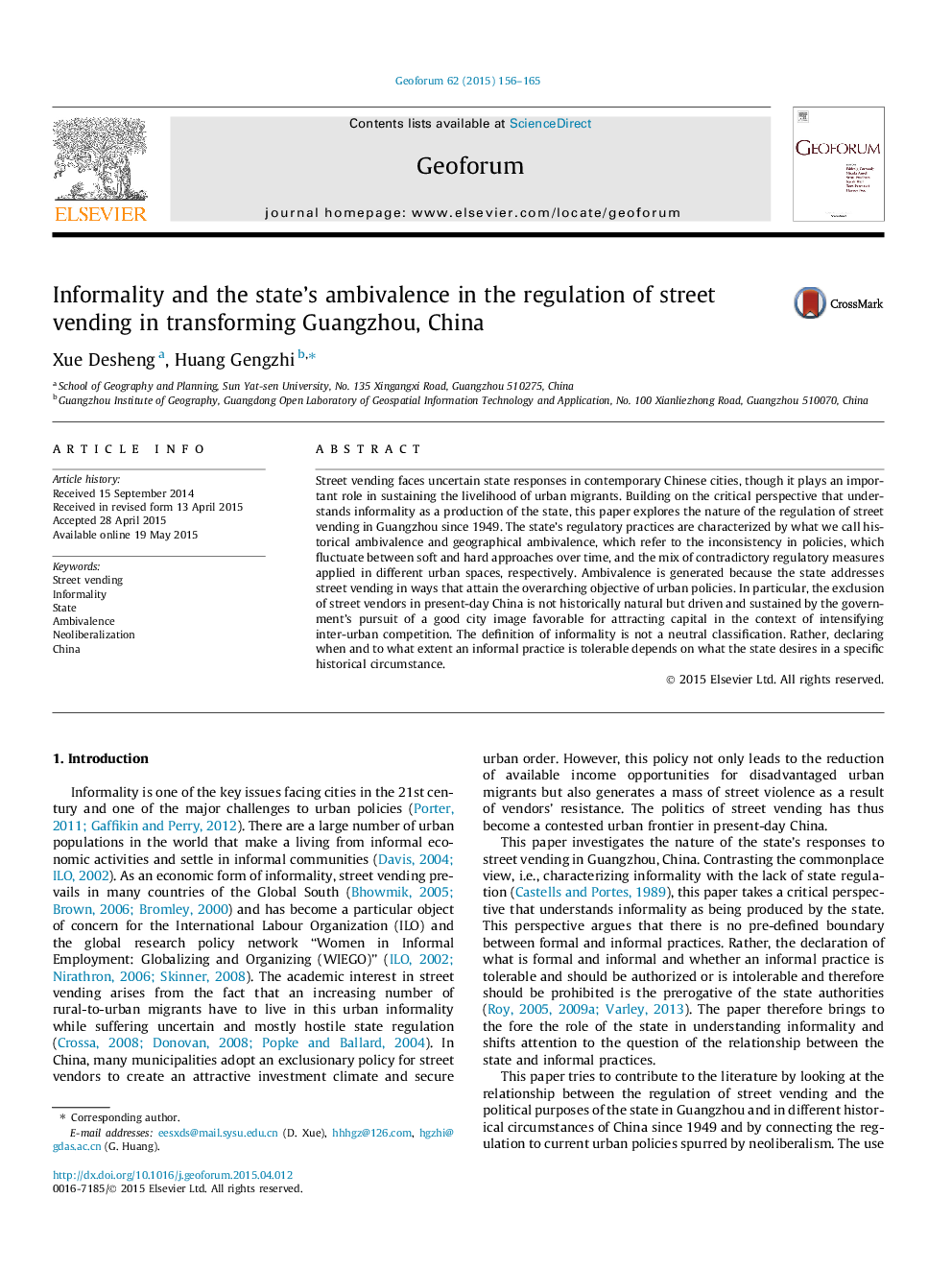| کد مقاله | کد نشریه | سال انتشار | مقاله انگلیسی | نسخه تمام متن |
|---|---|---|---|---|
| 5073578 | 1477127 | 2015 | 10 صفحه PDF | دانلود رایگان |
عنوان انگلیسی مقاله ISI
Informality and the state's ambivalence in the regulation of street vending in transforming Guangzhou, China
ترجمه فارسی عنوان
غیرمستقیم بودن و ناآرامی دولت در تنظیم مجازات خیابانی در تبدیل گوانگژو، چین
دانلود مقاله + سفارش ترجمه
دانلود مقاله ISI انگلیسی
رایگان برای ایرانیان
کلمات کلیدی
فروشگاه خیابانی، غیر رسمی، دولت، متقابل، نولیبرالیسم، چین،
ترجمه چکیده
ادارات خیابانی با واکنش های نامشخص دولت در شهرهای معاصر چینی مواجه هستند، هر چند نقش مهمی در حفظ معیشت مهاجران شهری ایفا می کند. این مقاله بر اساس دیدگاه انتقادی که غیرممکنی را به عنوان تولیدی از دولت میشناسد، در این مقاله به بررسی ماهیت مقررات فروش خیابان در گوانگجو از سال 1949 میپردازد. شیوههای نظارتی دولت، با آنچه که ما نامفهوم است، دوبیتی تاریخی و دوامداری جغرافیایی است که اشاره به ناسازگاری در سیاست هایی که نوسانات بین رویه های نرم و سخت در طول زمان است و به ترتیب ترکیبی از اقدامات نظارتی متناقض در فضاهای شهری مختلف انجام می شود. همبستگی ایجاد می شود زیرا دولت به منظور دستیابی به اهداف کلان سیاست های شهری، اقدام به فروش خیابان می کند. به طور خاص، محروم کردن فروشندگان خیابانی در چین امروز از لحاظ تاریخی طبیعی نیست اما به دنبال دستیابی دولت به یک تصویر خوب برای جذب سرمایه در زمینه تشدید رقابت بین شهری است. تعریف غیر رسمی طبقه بندی بیطرفی نیست. در عوض، اعلام زمان و تا چه حد یک عمل غیر رسمی قابل تحمل بستگی به آنچه که دولت در یک شرایط تاریخی خاص می خواهد.
موضوعات مرتبط
علوم انسانی و اجتماعی
اقتصاد، اقتصادسنجی و امور مالی
اقتصاد و اقتصادسنجی
چکیده انگلیسی
Street vending faces uncertain state responses in contemporary Chinese cities, though it plays an important role in sustaining the livelihood of urban migrants. Building on the critical perspective that understands informality as a production of the state, this paper explores the nature of the regulation of street vending in Guangzhou since 1949. The state's regulatory practices are characterized by what we call historical ambivalence and geographical ambivalence, which refer to the inconsistency in policies, which fluctuate between soft and hard approaches over time, and the mix of contradictory regulatory measures applied in different urban spaces, respectively. Ambivalence is generated because the state addresses street vending in ways that attain the overarching objective of urban policies. In particular, the exclusion of street vendors in present-day China is not historically natural but driven and sustained by the government's pursuit of a good city image favorable for attracting capital in the context of intensifying inter-urban competition. The definition of informality is not a neutral classification. Rather, declaring when and to what extent an informal practice is tolerable depends on what the state desires in a specific historical circumstance.
ناشر
Database: Elsevier - ScienceDirect (ساینس دایرکت)
Journal: Geoforum - Volume 62, June 2015, Pages 156-165
Journal: Geoforum - Volume 62, June 2015, Pages 156-165
نویسندگان
Xue Desheng, Huang Gengzhi,
